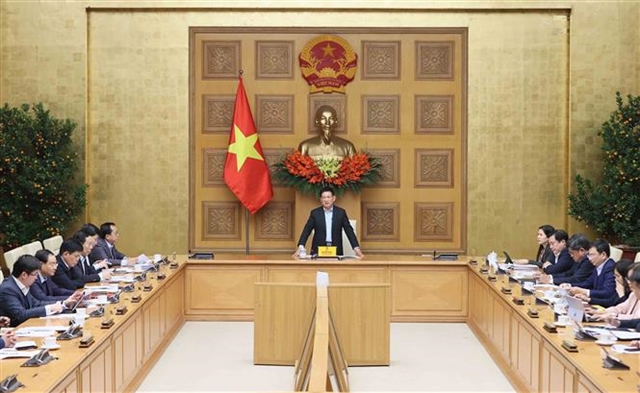To maintain economic stability, the Deputy Prime Minister underscored the need for an uninterrupted supply of fuel, electricity, and essential goods.

HÀ NỘI — Việt Nam’s economic strategy for 2025 hinges on balancing robust GDP growth with stringent inflation control, Deputy Prime Minister Hồ Đức Phớc said during a meeting of the Price Management Steering Committee on Thursday in Hà Nội.
Reviewing the economic performance of 2024 and outlining measures for the year ahead, the deputy PM reiterated the Government’s ambition to achieve at least 8 per cent GDP growth in 2025.
To curb inflationary pressures, the Ministry of Finance has put forward three inflation scenarios for 2025: inflation at 3.83 per cent, at 4.15 per cent and at 4.5 per cent. Phớc endorsed the mid-range target of 4.15 per cent, but urged a concerted effort to lower it further if possible. He directed ministries and relevant agencies to draft quarterly price management plans, which will be reviewed by the Ministry of Finance and the General Statistics Office.
Additionally, he emphasised the need for strict enforcement of the Price Law to prevent market manipulation, hoarding and price gouging. Transparency in pricing, he stressed, is key to maintaining consumer trust.
“Businesses must display and sell goods at listed prices. Whether prices are high or low is secondary; what matters is ensuring fair competition and consumer trust,” he said.
To maintain economic stability, the deputy PM underscored the need for an uninterrupted supply of fuel, electricity and essential goods. Any disruptions, he warned, could significantly impact production, trade and logistics. He called for proactive management of State-controlled commodities such as fuel, gold and land, advocating for timely interventions from the start of the year to mitigate market volatility.
Global market trends will also be closely monitored to allow for flexible policy adjustments. Coordination between monetary and fiscal policies will be strengthened, while stricter oversight on price disclosures and enforcement measures will be put in place to prevent violations.
Projections for 2025
Deputy Minister of Finance Lê Tấn Cận said Việt Nam’s average Consumer Price Index (CPI) in 2024 rose by 3.63 per cent, staying within Government targets. The primary contributors to inflation were food and dining services, which increased by 4.03 per cent and accounted for 1.35 per cent of the overall CPI rise; housing, utilities and construction materials, which grew by 5.2 per cent and contributed 0.98 per cent; and healthcare, which surged by 7.16 per cent, adding 0.39 per cent to inflation.
In January 2025, the CPI saw a month-on-month increase of 0.98 per cent and a year-on-year rise of 3.63 per cent, largely driven by adjustments in healthcare fees and rising food and transport costs.
Looking ahead, the Ministry of Finance has projected inflation rates of 3.83 per cent, 4.15 per cent or 4.5 per cent, while the General Statistics Office has forecast similar figures ranging between 3.8 per cent and 4.5 per cent. Meanwhile, the State Bank of Việt Nam has projected inflation to hover around 4 per cent, though it warned that exceeding the 4.5 per cent threshold remains a possibility should GDP growth surpass 8 per cent.
The Government plans to sustain reserves of essential goods and strategic stockpiles for disaster relief. Additionally, post-disaster agricultural recovery efforts will be expedited to prevent supply shortages. In line with broader economic reforms, State-managed services will gradually transition to market-based pricing to ensure sustainable fiscal policies while mitigating inflationary pressures. — VNS





